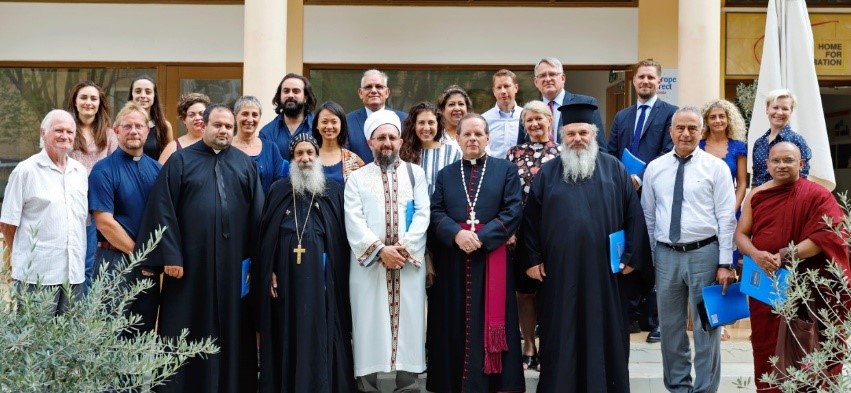Scenario F: A case to debate on individual interventions by religious actors
#Faith4Rights toolkit
| Domestic violence routinely occurs in the State of Domestico. Affected family members, usually women and children, rarely report domestic violence to the authorities for obvious reasons, including lack of trust in the male-dominated police and administration of justice. Women brought the systemic problem of domestic violence to the attention of various religious leaders at their places of worship and requested to remain anonymous and not to file a complaint to the police. A religious leader from the majority religion in the State of Domestico made this issue the topic of his regular sermon service, alerting husbands to their responsibilities and to the devastating impact of domestic violence on children. This approach did not yield any improvements, as indicated by the continuously rising informal complaints by women. The religious leader in question decided to call upon concerned husbands and dissuade them from their misbehaviour and threatening to inform the police. The situation of women affected worsened after this intervention. The religious leader issued a religious edict to the effect that persistence in harming one’s partner disqualifies the belief of this person. Women stopped complaining to religious leaders but nothing indicates that men changed their attitudes and action. |
Questions:
A sample of questions related to this case could include the following:
- Was the religious leader's action right?
- What could he have done better?
- Would this case have been easier to handle if there were women religious leaders and why?
- Is a police intervention more effective than a faith-based intervention in this case?
- How would participants have handled this case differently?
- Going beyond of the scope of this particular hypothetical case, participants could be asked if they had issued themselves a religious edict, participate in or know of that would constitute an interesting training module in terms of relationships, tensions or complementarity between faith and rights, religious teachings and positive law? Why?
A tip for facilitators
The rationale of this case to debate is multiple: it helps participants to own the training exercise, then apply what they learn, link human rights and faith, and admit that human interpretations are subject to scrutiny.
 Facilitators may also wish to refer to the 2017 statement of the religious leaders of Cyprus condemning all forms of violence against women and girls: "We strongly condemn violence committed against women and girls and express our commitment to share this message with our respective faith communities and society as a whole. We categorically reject the misuse of religion to vindicate any form of violence against women and girls and express our united voice against all forms of violence against them. We pray for healing and wholeness and reach out to all women and girls that have fallen victim to violence. We are committed to ensure that violence against women and girls are recognised, condemned and that there are legal frameworks and institutions capable of dealing with it. In this regard, we are committed to work together with state and civil society partners to end violence against women and girls in Cyprus."
Facilitators may also wish to refer to the 2017 statement of the religious leaders of Cyprus condemning all forms of violence against women and girls: "We strongly condemn violence committed against women and girls and express our commitment to share this message with our respective faith communities and society as a whole. We categorically reject the misuse of religion to vindicate any form of violence against women and girls and express our united voice against all forms of violence against them. We pray for healing and wholeness and reach out to all women and girls that have fallen victim to violence. We are committed to ensure that violence against women and girls are recognised, condemned and that there are legal frameworks and institutions capable of dealing with it. In this regard, we are committed to work together with state and civil society partners to end violence against women and girls in Cyprus."